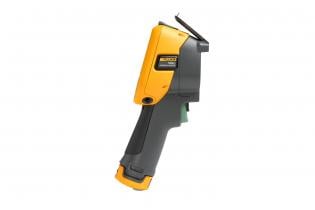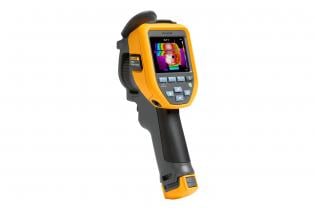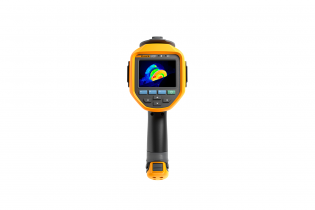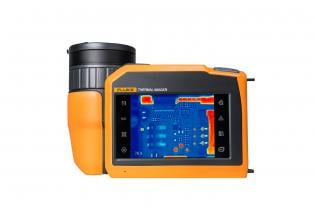Thermal Imaging Cameras
Temperature can be a sign of trouble ahead. With Fluke thermal cameras you can detect issues before they become problems. Designed for everyday use, in the toughest industrial environments, Fluke offers infrared cameras for a wide range of applications.
Handheld thermal cameras are best for preventive maintenance, electrical inspections, and frontline troubleshooting. While articulating thermal cameras are best for when you need pinpoint accuracy from both near and far, from electrical utilities to research and development. And mounted thermal cameras are the strongest in the bunch, ideal for research, science and engineering applications allowing for continuous infrared data collection.
Find the best thermal camera for your needs
Select the right thermal camera to suit the inspections, maintenance, and troubleshooting you need to conduct.
Fluke iSee™ Mobile Thermal Camera - TC01A/TC01B/TC01C
With the Fluke iSee™ Mobile Thermal Camera, temperature can be measured and thermal imaging...
Compact Fluke PTi120 Pocket Thermal Camera
Available from 30/04/2019 A handheld thermal camera so compact and easy to use you can empower your...
Fluke TiS20+ MAX Thermal Imaging Camera
Ideal for HVAC, mechanical and electrical inspections. 2-meter drop tested, IP54 water/dust...
Fluke TiS55+ Thermal Camera
256 x 192 IR resolution, asset tagging, voice annotation, IR-PhotoNotes and touchscreen IR-Fusion.
TiS75+ Thermal Camera
Features 384 x 288 infrared resolution, touchscreen, video recording, dew-point calculation.
Fluke TiX501 Thermal Camera
The Fluke TiX501 thermal camera takes your inspections to the next level. Capture high quality...
Fluke TiX580 Infrared Camera
Get stunning 640 x 480 resolution thermal images and surprising affordability.
Fluke TiX1060 Thermal Camera
Fluke's next generation expert series thermal camera with 1024 x 768 resolution.
Fluke SmartView® IR Analysis Reporting Software and Mobile App
This powerful software provides a suite of tools that views, optimizes, annotates, and analyzes IR...
Frequently asked questions for infrared thermal imaging cameras
What is a Thermal Camera?
A thermal camera is an inspection tool that captures infrared energy – radiation emitted from an object – and creates an image. Thermal cameras, also known as infrared cameras and thermal imagers, are ideal for industrial inspection. Maintenance, leak detection, and machine troubleshooting are all common applications.
What is a Thermal Camera Used For?
Thermal cameras can be used for a broad range of applications: building inspection, security, electrical maintenance, firefighting, gas detection, and beyond. Thermography is an especially powerful test method for uses in which:
- Remote inspection is essential for safety
- Damage or decay is expressed through temperature changes, such as in three-phase wiring
- Test objects/subjects are obscured due to poor visibility
What Makes Thermal Imaging Cameras Useful?
Some thermal imaging cameras can see up to 1km and beyond, but most can’t see through thick solid surfaces like walls.
What is Thermal Imaging?
Thermal imaging is the process of capturing infrared radiation and translating it into thermal images, or thermograms. Thermal imaging shows variations in temperature expressed in color. Powerful infrared cameras are incredibly sensitive, displaying heat in great detail with color gradients.
How Does Thermal Imaging Work?
Everything around us emits infrared energy – a heat signature. Thermal imaging works by measuring infrared energy and converting that data into electronic images that display surface temperature. An optical system focused infrared energy to a sensor array, or detector chip, with thousands of pixels in a grid. A matrix of colors corresponding to temperatures is sent to the camera display as a picture.
What is an Infrared Scanner?
An infrared scanner measures human temperature, often mounted for continuous monitoring and with a large display. Infrared scanning is a term most often used for human body temperature measurement. However, infrared scanners can also be used for applications like scanning machines, concrete, and buildings.
Choosing the Best Thermal Camera
The best infrared thermal imaging camera is the one the has the price point, ruggedness, portability, thermal sensitivity, and image resolution you need.
- Best for handheld inspections: Fluke Ti480 PRO Infrared Cameras are lightweight, handheld imagers with powerful sensitivity that make it easy to discover and diagnose issues.
- Best for research applications: Fluke RSE600 Mounted Infrared Cameras give you the power to stream thermal images via desktop software, connect to MATLAB and LabVIEW software, and perform R&D analysis.
- Best for industrial inspections: Fluke TiX580 Infrared Cameras are rugged handheld cameras with an easy-to-read 5.7 inch LCD display and the ability to capture high-resolution 1280 x 960 images.














